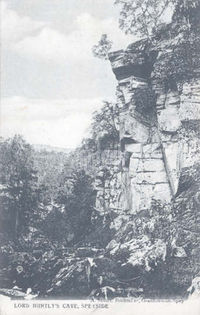Annotation:Lord Huntly's Cave: Difference between revisions
No edit summary |
Alan Snyder (talk | contribs) (Fix HTML, citation) |
||
| Line 2: | Line 2: | ||
---- | ---- | ||
<p><font face="garamond, serif" size="4"> | <p><font face="garamond, serif" size="4"> | ||
'''LORD HUNTLY'S CAVE.''' Scottish, Marching Air (4/4 time). D Major. Standard tuning (fiddle). AABB. The march was composed by [[Biography:J. Scott Skinner]] | '''LORD HUNTLY'S CAVE.''' Scottish, Marching Air (4/4 time). D Major. Standard tuning (fiddle). AABB. The march was composed by [[Biography:J. Scott Skinner]] and first appears in his '''Scottish Violinist''' of 1900. | ||
<br> | <br> | ||
<br> | <br> | ||
</font></p> | |||
[[File:lordhuntly'scave.jpg|200px|thumb|left|Lord Huntly's Cave, c. 1905 (Am Baile)]] | [[File:lordhuntly'scave.jpg|200px|thumb|left|Lord Huntly's Cave, c. 1905 (Am Baile)]] | ||
<p><font face="garamond, serif" size="4"> | |||
Lord Huntly's cave is located north of Grantown, Speyside, in a rocky glen about two miles from Castle Grant. It is named for Lewis Gordon, 3rd Marquis of Huntly, who was a Royalist in the English Civil War, siding with King Charles I against the Covenanters, a religious and political movement that opposed the king's interference in the Presbyterian Church in Scotland. When fortunes turned against him, according to tradition, Gordon was concealed for some time in the cave, aided by Mary, the daughter of the laird, Sir John Grant, who carried supplies to the fugitive. Her attentions led to their marriage. | Lord Huntly's cave is located north of Grantown, Speyside, in a rocky glen about two miles from Castle Grant. It is named for Lewis Gordon, 3rd Marquis of Huntly, who was a Royalist in the English Civil War, siding with King Charles I against the Covenanters, a religious and political movement that opposed the king's interference in the Presbyterian Church in Scotland. When fortunes turned against him, according to tradition, Gordon was concealed for some time in the cave, aided by Mary, the daughter of the laird, Sir John Grant, who carried supplies to the fugitive. Her attentions led to their marriage. | ||
<br> | <br> | ||
| Line 16: | Line 18: | ||
</font></p> | </font></p> | ||
<p><font face="garamond, serif" size="4"> | <p><font face="garamond, serif" size="4"> | ||
''Printed sources'': Moffat ('''Dance Music of the North'''), 1908; No. 45, p. 19. Skinner ('''The Scottish Violinist | ''Printed sources'': | ||
Moffat ('''Dance Music of the North'''), 1908; No. 45, p. 19. | |||
Skinner ('''The Scottish Violinist'''), 1900; p. 34 (with variations). | |||
Skinner ('''Harp and Claymore'''), 1904; p. 25 (includes variation sets). | |||
<br> | <br> | ||
<br> | <br> | ||
</font></p> | </font></p> | ||
<p><font face="garamond, serif" size="4"> | <p><font face="garamond, serif" size="4"> | ||
''Recorded sources'': <font color=teal>Beltona 78 RPM 2313, Jimmy Shand. Front Hall Records FHR-08, Alistair Anderson | ''Recorded sources'': | ||
<font color=teal> | |||
Beltona 78 RPM 2313, Jimmy Shand. | |||
Front Hall Records FHR-08, Alistair Anderson – "Traditional Tunes" (1976). | |||
Munich Records, Battlefield Band – "Live Celtic Folk Music" (1998). | |||
</font> | |||
<br> | <br> | ||
<br> | <br> | ||
| Line 30: | Line 40: | ||
</font></p> | </font></p> | ||
<br> | <br> | ||
<br> | <br style="clear:both"/> | ||
---- | ---- | ||
=='''Back to [[{{BASEPAGENAME}}]]'''== | =='''Back to [[{{BASEPAGENAME}}]]'''== | ||
Revision as of 04:30, 26 February 2017
Back to Lord Huntly's Cave
LORD HUNTLY'S CAVE. Scottish, Marching Air (4/4 time). D Major. Standard tuning (fiddle). AABB. The march was composed by Biography:J. Scott Skinner and first appears in his Scottish Violinist of 1900.

Lord Huntly's cave is located north of Grantown, Speyside, in a rocky glen about two miles from Castle Grant. It is named for Lewis Gordon, 3rd Marquis of Huntly, who was a Royalist in the English Civil War, siding with King Charles I against the Covenanters, a religious and political movement that opposed the king's interference in the Presbyterian Church in Scotland. When fortunes turned against him, according to tradition, Gordon was concealed for some time in the cave, aided by Mary, the daughter of the laird, Sir John Grant, who carried supplies to the fugitive. Her attentions led to their marriage.
Source for notated version:
Printed sources:
Moffat (Dance Music of the North), 1908; No. 45, p. 19.
Skinner (The Scottish Violinist), 1900; p. 34 (with variations).
Skinner (Harp and Claymore), 1904; p. 25 (includes variation sets).
Recorded sources:
Beltona 78 RPM 2313, Jimmy Shand.
Front Hall Records FHR-08, Alistair Anderson – "Traditional Tunes" (1976).
Munich Records, Battlefield Band – "Live Celtic Folk Music" (1998).
See also listing at:
Jane Keefer's Folk Music Index: An Index to Recorded Sources [1]
